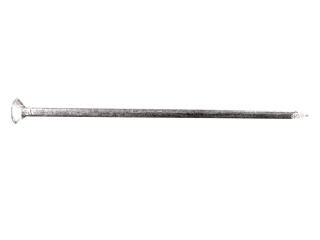Point of Decision
Normally, time dims memory or sharpens it to the point of exaggeration.
The inhabitants of Jericho didn't need to exaggerate the stories they had heard about the God of Israel—even forty years after the fact. When news came that Israel was parked on their doorstep, panic set in.
In an inn of sorts, perched on the walls of the city, a woman was given the opportunity to make a choice based on what she had heard. She chose to believe the stories.
"I know that the Lord has given this land to you and that a great fear of you has fallen on us, so that all who live in this country are melting in fear because of you. We have heard how the Lord dried up the water of the Red Sea for you when you came out of Egypt…When we heard of it, our hearts melted and everyone's courage failed because of you, for the Lord your God is God in heaven above and on the earth below" (Joshua 2:9, 10, 11, NIV).
The choice whether or not to believe God faces all of us continually. Whether it be in the big decisions of life or in the minutiae, we trust—or we don't. Rahab decided to trust what she had heard and saved herself and her family by doing so.
Our decisions aren't always a matter of physical life or death, as they were in Rahab's case, but they often affect the well-being of our spiritual state. Do I believe today, in this circumstance that faces me, in the light of this development, in the heat of this moment, that the stories of God's faithfulness and power are true?
Do I believe that the same God who took me through that "Red Sea" experience in my life so many years ago, is the same God who has brought me to this "Red Sea" that I face today?
Will I be a Rahab and trust? Or, will I be afraid like the rest of the inhabitants of Jericho and, blinded by my fear, make the poor choice of trusting in the crumbling walls of my own abilities and resources?
Good question.
P.S. The stories are no exaggeration.
The inhabitants of Jericho didn't need to exaggerate the stories they had heard about the God of Israel—even forty years after the fact. When news came that Israel was parked on their doorstep, panic set in.
In an inn of sorts, perched on the walls of the city, a woman was given the opportunity to make a choice based on what she had heard. She chose to believe the stories.
"I know that the Lord has given this land to you and that a great fear of you has fallen on us, so that all who live in this country are melting in fear because of you. We have heard how the Lord dried up the water of the Red Sea for you when you came out of Egypt…When we heard of it, our hearts melted and everyone's courage failed because of you, for the Lord your God is God in heaven above and on the earth below" (Joshua 2:9, 10, 11, NIV).
The choice whether or not to believe God faces all of us continually. Whether it be in the big decisions of life or in the minutiae, we trust—or we don't. Rahab decided to trust what she had heard and saved herself and her family by doing so.
Our decisions aren't always a matter of physical life or death, as they were in Rahab's case, but they often affect the well-being of our spiritual state. Do I believe today, in this circumstance that faces me, in the light of this development, in the heat of this moment, that the stories of God's faithfulness and power are true?
Do I believe that the same God who took me through that "Red Sea" experience in my life so many years ago, is the same God who has brought me to this "Red Sea" that I face today?
Will I be a Rahab and trust? Or, will I be afraid like the rest of the inhabitants of Jericho and, blinded by my fear, make the poor choice of trusting in the crumbling walls of my own abilities and resources?
Good question.
P.S. The stories are no exaggeration.




Comments
Post a Comment